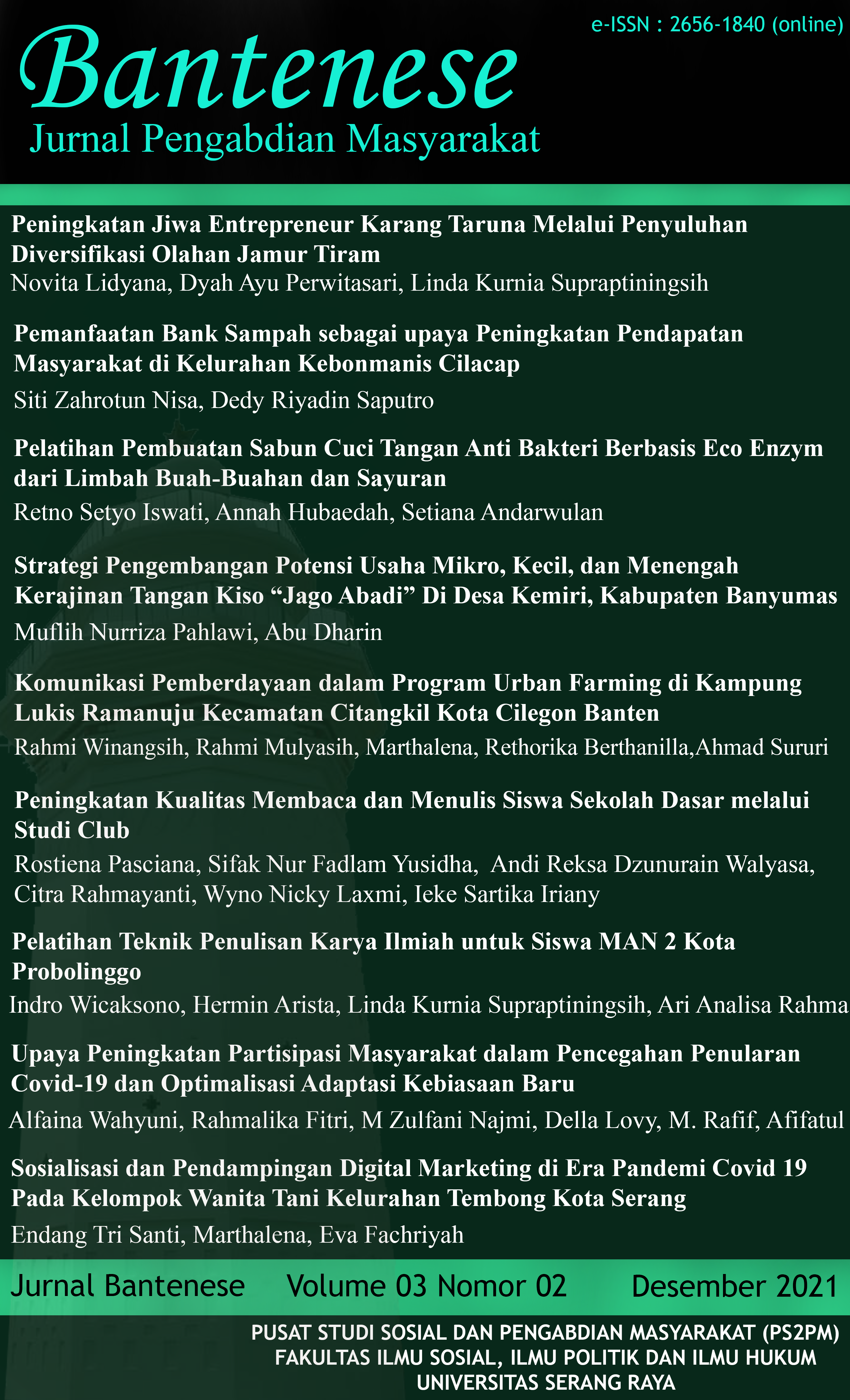Pelatihan Pembuatan Sabun Cuci Tangan Anti Bakteri Berbasis Eco Enzym dari Limbah Buah-Buahan dan Sayuran
DOI:
https://doi.org/10.30656/ps2pm.v3i2.4007Keywords:
Hand Soap, Anti Bacterial, Eco EnzymAbstract
The behavior of washing hands with soap is an important component to break the chain of spread and transmission of the corona virus. Antiseptic hand soap that has been circulating in the market contains chemical disinfectant ingredients as a powerful component to kill various pathogenic microorganisms including the corona virus. Frequent and long-term use of hand soap will have side effects on the skin in the area of ​​use. Eco enzyme is a product in the form of a liquid from the fermentation of organic waste from vegetables and fresh fruits. The content of eco enzyme is acetic acid (H3COOH) which can kill germs, viruses and bacteria. The selection of eco enzyme as the basic ingredient for making hand soap because it utilizes organic kitchen waste from the remnants of vegetables and fruits as well as the content of eco enzyme that can kill germs, viruses and bacteria and is environmentally friendly. This activity aims to increase public knowledge about eco enzymes and create innovative products by utilizing organic waste that functions for health and is environmentally friendly. The training method used is to provide material in lectures, discussions, demonstrations and assistance in making hand soap. The participants of the activity were people from RW 10, Keputran sub-district, Tegalsari sub-district, Surabaya, totaling 20 people. Evaluation was carried out directly at the end of the activity by discussing and seeing the results of hand washing soap production. Eco-enzyme-based hand soap still requires further development, especially as an anti-covid hand soap
References
Aruna, C., & P, S. (2015). Solubilisation of Waste Activated Sludge Using Garbage 3 Enzyme Produced From Different Pre-Consumer Organic Waste. RSC Advances, 5, 51421–51427.
Dina, Y. O., Azmi, A. A., Muryaningsih, I., Cholily, H. V., Pratama, K. R., & Silviana, S. (2021). ORGANIC WASTE ENZYME PROTECT COVID-19 SEBAGAI PRODUK SANITASI EKONOMIS DAN RAMAH LINGKUNGAN DENGAN INOVASI PERCEPATAN ECO_FERMENTO. 3(2), 0–5.
Rochyani, N., Utpalasari, R. L., & Dahliana, I. (2020). ANALISIS HASIL KONVERSI ECO ENZYME MENGGUNAKAN NENAS (Ananas comosus ) DAN PEPAYA (Carica papaya L.). 5(2), 135–140.
Safitri, I., Yuliono, A., Sofiana, M. S. J., Helena, S., Kushadiwijayanto, A. A., & Warsidah, W. (2021). Peningkatan Kesehatan Masyarakat Teluk Batang secara Mandiri melalui pembuatan Handsanitizer dan Desinfektan berbasis Eco-Enzyme dari Limbah Sayuran dan Buah. Journal of Community Engagement in Health, 4(2), 371–377. https://doi.org/10.30994/jceh.v4i2.248
Sulaeman, Suparto, & Eviati. (2005). Petunjuk Teknik Analisis Kimia Tanah, Tanaman, dan Pupuk.
Sultan, M., & Zikri, L. O. K. (2021). Membiasakan Cuci Tangan Pakai Sabun Pada Masyarakat Saat Pandemi COVID-19 di Kompleks Perumahan Kota Samarinda. Jurnal Abdimas BSI: Jurnal Pengabdian Kepada Masyarakat, 4(2), 279–286. https://ejournal.bsi.ac.id/ejurnal/index.php/abdimas/article/view/10417


















